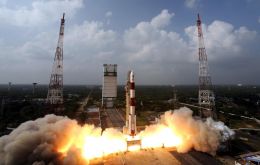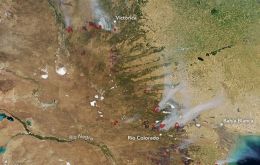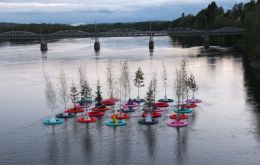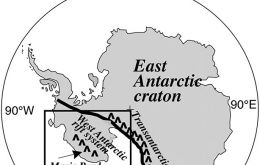MercoPress. South Atlantic News Agency
Tag: NASA
-
Thursday, February 14th 2019 - 10:11 UTC
Mars exploration NASA pioneer robot officially “dead” after 14 years

During 14 years of intrepid exploration across Mars, it advanced human knowledge by confirming that water once flowed on the red planet - but NASA's Opportunity rover has analyzed its last soil sample. The robot has been missing since the US space agency lost contact during a dust storm in June last year and was declared officially dead on Wednesday, ending one of the most fruitful missions in the history of space exploration.
-
Wednesday, October 24th 2018 - 08:49 UTC
NASA pictures a rectangular iceberg floating in the Weddell Sea

Nasa has released a striking photo of a rectangular iceberg floating in the Weddell Sea off Antarctica. The US space agency said the object's sharp angles and flat surface suggested it had recently broken away from an ice shelf. The edges are still pointed, and have not yet been worn down by the ocean waves.
-
Tuesday, October 2nd 2018 - 09:12 UTC
NASA scientists solve mysteries of the Earth's rotation wobbling

Using satellite data on how water moves around Earth, NASA scientists have solved two mysteries about wobbles in the planet's rotation - one new and one more than a century old. The research may help improve our knowledge of past and future climate.
-
Friday, August 31st 2018 - 08:34 UTC
India announces its first manned space mission to cost US$1.4bn

India announced it expected to spend less than 100 billion rupees (US$1.43 billion) on its first manned space mission to be launched by 2022, suggesting it is likely to be cheaper than similar projects by the United States and China.
-
Wednesday, January 31st 2018 - 20:06 UTC
Lunar trifecta: supermoon, blood moon and blue moon; NASA livestreaming

It’s a once in a ‘blue moon’ occurrence and time for the moon to take the spotlight. Following the great solar eclipse last August, serendipity will strike on Wednesday 31 January, when a total lunar eclipse is set to occur at the same time as a supermoon and blue moon.
-
Wednesday, January 31st 2018 - 09:29 UTC
NASA satellite keeps track of wildfires in Argentina

Roughly 12,000 wildfires burn each year in Argentina, charring more than 1.3 million hectares (5,000 square miles) of forest and grasslands. The Moderate Resolution Imaging Spectroradiometer (MODIS) on NASA’s Aqua satellite captured an image of one of them on January 29, 2018.
-
Monday, January 29th 2018 - 10:22 UTC
Ozone hole: NASA's satellite confirms 20% less depletion; recovery by 2080

Scientists have shown through direct satellite observations of the ozone hole that levels of ozone-destroying chlorine are declining. Measurements show that the decline in chlorine, resulting from an international ban on chlorine-containing man-made chemicals called chlorofluorocarbons (CFCs), has resulted in about 20% less ozone depletion during the Antarctic winter than there was in 2005, the first year that measurements of chlorine and ozone during the Antarctic winter were made by NASA's Aura satellite.
-
Friday, January 19th 2018 - 10:08 UTC
Global surface temperatures in 2017, the second warmest since 1880, says NASA

Earth’s global surface temperatures in 2017 ranked as the second warmest since 1880, according to an analysis by scientists at NASA’s Goddard Institute for Space Studies (GISS). Continuing the planet’s long-term warming trend, globally averaged temperatures in 2017 were 0.90 degrees Celsius (1.62 degrees Fahrenheit) warmer than the 1951 to 1980 mean. That is second only to global temperatures in 2016.
-
Friday, December 22nd 2017 - 10:36 UTC
Falklands included in US universities and NASA project to keep track of kelp floating forests

Kelp forests grow along coastlines worldwide, largely hidden from view. Like rainforests, they're among the planet's most important ecosystems: beautiful but fragile habitats for a wide array of plant and animal species. But scientists believe kelp forests are being threatened by climate change. Now, researchers from UCLA and seven other universities have an improved tool for tracking these shifting ecosystems, the largest of which is about 5 miles long.
-
Tuesday, November 14th 2017 - 10:30 UTC
Antarctica melting from below by some type of buried super-volcano, according to NASA research

The Antarctic is being melted from below, according to a new study by Nasa - and a type of buried super-volcano may be to blame. The Nasa study adds evidence that there is powerful geothermal activity underneath the ice, creating lakes and rivers below the surface.
